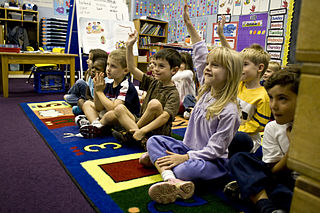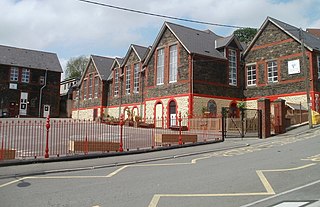Related Research Articles

Kindergarten is a preschool educational approach based on playing, singing, practical activities such as drawing, and social interaction as part of the transition from home to school. Such institutions were originally made in the late 18th century in Germany, Bavaria and Alsace to serve children whose parents both worked outside home. The term was coined by German pedagogue Friedrich Fröbel, whose approach globally influenced early-years education. Today, the term is used in many countries to describe a variety of educational institutions and learning spaces for children ranging from two to six years of age, based on a variety of teaching methods.
Education in England is overseen by the Department for Education. Local government authorities are responsible for implementing policy for public education and state-funded schools at a local level. State-funded schools may be selective grammar schools or non-selective comprehensive schools. All state schools are subject to assessment and inspection by the government department Ofsted. England also has private schools and home education; legally, parents may choose to educate their children by any suitable means.
This article provides an overview of education in Wales from early childhood to university and adult skills. Largely state funded and free-at-the-point-of-use at a primary and secondary level, education is compulsory for children in Wales aged five to sixteen years old. It differs to some extent in structure and content to other parts of the United Kingdom, in the later case particularly in relation to the teaching of the Welsh language.

Child care, otherwise known as day care, is the care and supervision of a child or multiple children at a time, whose ages range from two weeks of age to 18 years. Although most parents spend a significant amount of time caring for their child(ren), child care typically refers to the care provided by caregivers that are not the child's parents. Child care is a broad topic that covers a wide spectrum of professionals, institutions, contexts, activities, and social and cultural conventions. Early child care is an equally important and often overlooked component of child's developments.

A preschool, also known as nursery school, pre-primary school, play school or creche, is an educational establishment or learning space offering early childhood education to children before they begin compulsory education at primary school. It may be publicly or privately operated, and may be subsidized from public funds.

An infant school is a term used primarily in England and Wales, for the education of children between the ages of four and seven years. It is usually a small school serving a particular area. It is sometimes a department in a larger primary school educating children up to the age of approximately eleven years old.
The following outline is provided as an overview of and topical guide to childhood:

Hurst is a village in the civil parish of St Nicholas Hurst in the English county of Berkshire.

Pre-kindergarten is a voluntary classroom-based preschool program for children below the age of five in the United States, Canada, Turkey and Greece. It may be delivered through a preschool or within a reception year in elementary school. Pre-kindergartens play an important role in early childhood education. They have existed in the US since 1922, normally run by private organizations. The U.S. Head Start program, the country's first federally funded pre-kindergarten program, was founded in 1967. This attempts to prepare children to succeed in school.
KinderCare Learning Centers, LLC is an American operator of for-profit child care and early childhood education facilities founded in 1969 and currently owned by KinderCare Education based in Portland, Oregon. The company provides educational programs for children from six weeks to 12 years old. KinderCare is the third-largest privately held company headquartered in Oregon. In 39 states and the District of Columbia, some 200,000 children are enrolled in more than 1,250 early childhood education community centers, over 600 before-and-after school programs, and over 100 employer-sponsored centers. In 2021, revenue was US$7.8B (2021). In 2022, it acquired Crème de la Crème, a former competitor that provided complementary services.
A pre-school playgroup, or in everyday usage just a playgroup, is an organised group providing care and socialisation for children under five. The term is widely used in the United Kingdom. Playgroups are the same as preschool education and nursery schools. They can provide full-time care, or operate for only a few hours a day during school term time or all year round. The business model of a playgroup has changed across the year and they are now very similar to pre-schools, nurseries and schools. They are staffed by nursery nurses, nursery teachers or qualified nursery practitioners, and are run by private individuals or charities, rather than by the state or companies.
Educational stages are subdivisions of formal learning, typically covering early childhood education, primary education, secondary education and tertiary education. The United Nations Educational, Scientific and Cultural Organization (UNESCO) recognizes nine levels of education in its International Standard Classification of Education (ISCED) system. UNESCO's International Bureau of Education maintains a database of country-specific education systems and their stages. Some countries divide levels of study into grades or forms for school children in the same year.
Foundation Stage is the British government label for the education of pupils aged 2 to 5 in England. In Northern Ireland, it is also used to refer to the first two years of compulsory education for pupils aged 4 to 6.
The Mulberry Bush Charity was founded in 1948 as an independent residential special school in the village of Standlake in Oxfordshire, for children aged 5 to 12 years; nowadays it is a not-for-profit charity. It has now grown to include MB3 , The Mulberry Bush Outreach service, The Mulberry Bush Researchand The Mulberry Bush Consulting.
A naíonra is an Irish medium playgroup for pre-school children, which follows the principle of Total Early Immersion.

Professional Association for Childcare and Early Years (PACEY) is a charity and membership organisation based in London and working in England and Wales. A standard-setting organisation, it promotes best practice and support childcare professionals to deliver high standards of care and learning.
Early Years – the organisation for young children is a non-profit organisation based in Belfast, Northern Ireland. Formerly known as Nippa, it works to promote education and care services for young children. It provides support in the form of information and training to parents, childcare providers, employers and local authorities, as well as the development of programmes and projects to enhance the care and education provided for children.

Professor Christine Pascal (OBE) is a founding member of the European Early Childhood Education Research Association (EECERA) and is editor of the European Early Childhood Education Research Association Journal. She is co-director of the Centre for Research in Early Childhood (CREC), a charity based in Birmingham, and president of ECEERA.
A preschool, also known as kindergarten or child care centres in Singapore, is an educational establishment or learning space offering early childhood education to children before they begin compulsory education at primary school. All Singapore Citizens born after 1 January 1996 and living in Singapore must attend a national primary school unless an exemption is granted.
Early childhood education in the United States relates to the teaching of children from birth up to the age of eight. The education services are delivered via preschools and kindergartens.
References
- ↑ Fitzgerald, Damien; Janet Kay (2007). Working Together in Children's Services. Routledge. p. 41. ISBN 978-1-84312-467-2.
- ↑ charitiesdirect.com Archived 2012-07-30 at archive.today
- ↑ Jeger, Lena (19 September 2002). "Obituary: Mary Stott". The Guardian. London.
- ↑ Changing Curriculum for Early Childhood Education in England
- ↑ "BBC - Mid Wales Newtown Life - Wales Pre-school Playgroup Association". Archived from the original on 2009-08-06. Retrieved 2011-11-23.
- ↑ Elizabeth Wilson, Only Halfway to Paradise: women in postwar Britain, 1945-1968 (1980), p. 183; Internet Archive.
- ↑ Nanette Whitbread, The Evolution of the Nursery-infant School: a history of infant and nursery education in Britain, 1800-1970 (1972), p. 115; Internet Archive.
- ↑ Katherine M. Hirst, Cathy Nutbrown, Perspectives on Early Childhood Education: contemporary research (2005), p. 14; Google Books.
- ↑ "Analysis: Pre-School Learning Alliance - Happy birthday, PLA! | Nursery World". Archived from the original on 2012-04-26. Retrieved 2011-11-23.
Nursery World article celebrating 50 years of the Alliance in 2011 http://www.nurseryworld.co.uk/nursery-world/news/1095847/analysis-pre-school-learning-alliance-happy-birthday-pla